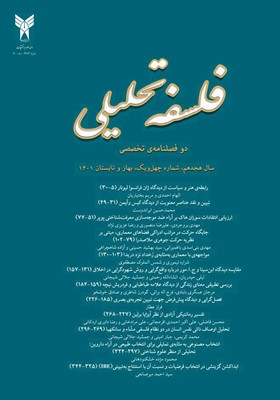ابداکشن گزینشی در انتخاب فرضیات و نسبت آن با استنتاج بهتبیینی (IBE)
محورهای موضوعی : فلسفه
1 -
کلید واژه: استنتاج بهتبیینی (IBE), ابداکشن خلاق, ابداکشن گزینشی, ابداکشن وابسته به واقع, فرضیه,
چکیده مقاله :
ابداکشن گزینشی در مقابل ابداکشن خلاق و نیز استنتاج بهتبیینی (IBE) قرار میگیرد. گزینش فرضیات یا از میان فرضیات جدید و حدسی و بدون دانش قبلی صورت میپذیرد (ابداکشن گزینشی پیرسی)؛ یا اینکه گزینش فرضیات و تبیینها بهتر از میان تعداد زیادی از فرضیات و تبیینهای ممکن که از قبل دانسته شده است صورت میپذیرد (ابداکشن گزینشی مگنانی و ابداکشن وابسته به امر واقع شورز). بر مبنای هر دو دیدگاه، و نیز بر مبنای دیدگاه سوم که مربوط به گبای و وودز است، ابداکشن گزینشی متمایز از استنتاج بهتبیینی (IBE) است. ابداکشن وابسته به امر واقع شورز واجد هر سه فرآیند فرعی استنتاج، یعنی ارتباط، مشاهده و حکم است (c،o و j)؛ در حالی که ابداکشن گزینشی پیرس تنها واجد فرآیند فرعی سوم، یعنی حکم است (j)، و بنابراین آن را نمیتوان به عنوان یک فرآیند استنتاج ابداکشنی معرفتی در نظر گرفت.
Selective abduction is in contrast with creative abduction as well as Inference to the Best Explanation (IBE). There are two types of selective abduction: Either hypotheses are selected among new and conjectural hypotheses without any prior knowledge ( Pierce s' selective abduction), or the selection of the best hypotheses and explanations is among a large number of possible hypotheses and explanations already known (L. Magnani's selective abduction and G. Schurz's factual abduction). According to both views, as well as an alternative view, which belongs to Dov M. Gabby and John Woods, selective abduction is different from inference to the best explanation. Schurz's factual abduction depends on all three sub-processes of inference, i.e.: colligation, observation, and judgment (c, o, and j); But Pierce's selective abduction, on the other hand, has only a third sub-process, i.e. judgment process (j), and therefore it cannot be regarded as a process of abductive epistemic inference.
_||_


